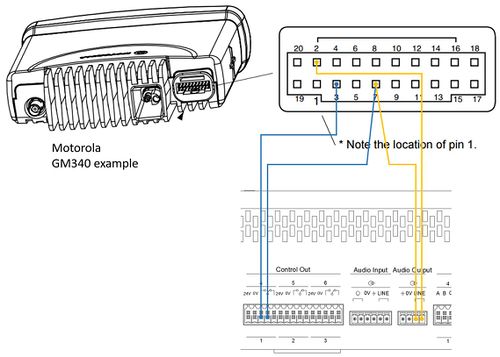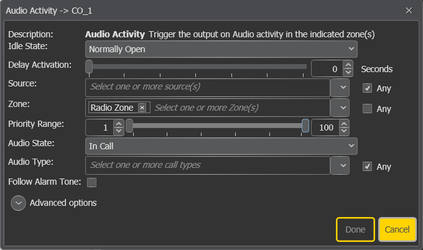Difference between revisions of "Analog radio integration"
(→Wiring) |
|||
| Line 7: | Line 7: | ||
===Wiring=== | ===Wiring=== | ||
| − | [[File:Radio Interface Exigo.JPG| | + | [[File:Radio Interface Exigo.JPG|500px|thumb|left|alt=Radio interface from ESC-1 to GM360|Radio interface from ESC-1 to GM360]] |
<br style="clear:both;" /> | <br style="clear:both;" /> | ||
Diagram shows wiring from ESC-1 to a GM360 radio. The same principle can be used for other radios from different manufacturers.<br> | Diagram shows wiring from ESC-1 to a GM360 radio. The same principle can be used for other radios from different manufacturers.<br> | ||
Revision as of 06:56, 19 October 2016
This article describes how to set up analog radio integration in Exigo.
Exigo can be integrated with analog radio solutions by using control outputs and control inputs.
Audio from Exigo to Radio using ESC-1
Audio from Exigo can be sent out on a radio. The radio will then be a special zone which are only used for radio.
Wiring
Diagram shows wiring from ESC-1 to a GM360 radio. The same principle can be used for other radios from different manufacturers.
Other Exigo devices such as kits can be used instead of ESC-1 when required. This is especially useful when the radio is located far from the ESC-1.
Configuration
Radio integration is for Exigo the same as any other analog audio integration.
1. Assign the line output to a zone. No other audio channels need to be part of this zone
2. Program audio activity on the control output which is used.
2a. In Zone add the zone which contains the line output.
2b. Set priority range to 1-100. All audio sent to the radio zone will now trigger the control output which will key the radio.

